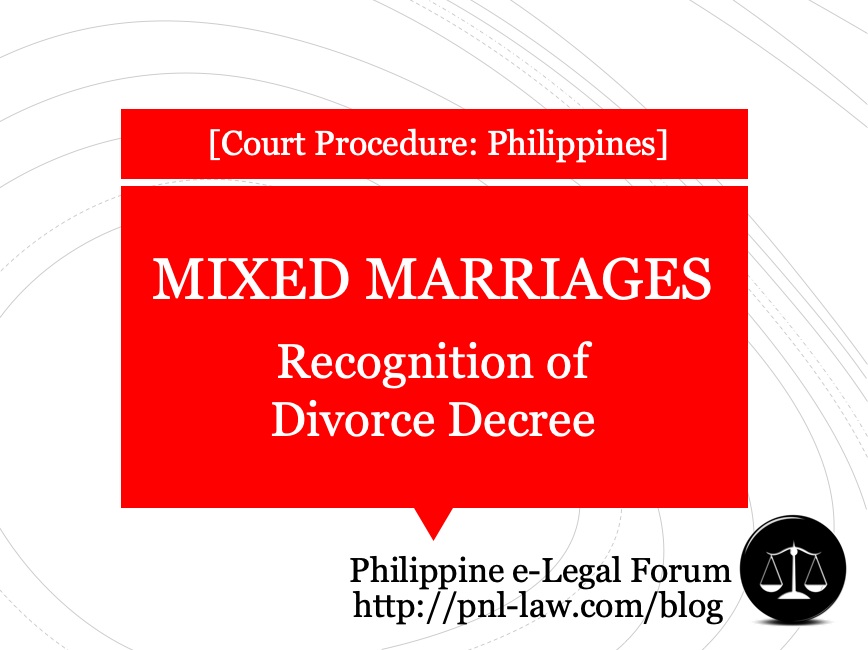Divorce is not allowed under Philippine laws, a prohibition which attaches, based on the nationality principle, to Filipinos wherever they may go anywhere in the world. Divorce bills have been filed in Congress through the years, but there seems to be no earnest interest in tackling it. Nevertheless, Philippine laws do recognize the fact of divorce.

I. ARTICLE 26
The recognition of divorce is contained in the second paragraph of Article 26 of the Family Code. Article 26 reads, in full:
Art. 26. All marriages solemnized outside the Philippines, in accordance with the laws in force in the country where they were solemnized, and valid there as such, shall also be valid in this country, except those prohibited under Articles 35 (1), (4), (5) and (6), 36, 37 and 38.
Where a marriage between a Filipino citizen and a foreigner is validly celebrated and a divorce is thereafter validly obtained abroad by the alien spouse capacitating him or her to remarry, the Filipino spouse shall have capacity to remarry under Philippine law. [Underscoring supplied]
[See also: Process of Judicial Recognition of a Foreign Divorce Decree]
II. PREVIOUS INTERPRETATION
A basic reading of this provision gives the clear impression that it applies when: (a) there is a marriage between a Filipino citizen and a foreigner; and (b) divorce is thereafter obtained abroad by the alien spouse, capacitating the alien spouse to remarry. The Filipino spouse can then move to have the divorce recognized in the Philippines, then he/she can also remarry.
As explained by the Supreme Court in Republic vs. Manalo, (G.R. No. 221029, 24 April 2018), paragraph 2 of Article 26 “authorizes our courts to adopt the effects of a foreign divorce decree precisely because the Philippines does not allow divorce,” and that the idea is to “avoid the absurd situation of a Filipino as still being married to his or her alien spouse, although the latter is no longer married to the former because he or she had obtained a divorce abroad that is recognized by his or national law.”
III. WHEN A FILIPINO LOSES HIS/HER CITIZENSHIP
Philippine laws, including the Constitution, explicitly protects the family and the institution of marriage. The previous interpretation of Article 26 is that it applies to Filipinos, even when they subsequently lose their Philippine citizenship and becomes a foreigner. If a contrary interpretation is accepted, the previous argument goes, the law becomes anti-poor, as the rich can easily acquire a foreign citizenship, get a divorce, and come back to remarry.
This argument was laid to rest in the 2005 case of Orbecido, when the Supreme Court concluded that Paragraph 2 “applies to a case where, at the time of the celebration of the marriage, the parties were Filipino citizens, but later on, one of them acquired foreign citizenship by naturalization, initiated a divorce proceeding, and obtained a favorable decree.” If the former Filipino spouse secures a divorce abroad, the divorce is valid and will be recognized in the Philippines, capacitating the Filipino spouse to remarry as well.
IV. WHEN THE FILIPINO SPOUSE FILES FOR DIVORCE
The 2005 ruling applies when the divorce is initiated by the alien spouse (the former Filipino who lost her citizenship and became a U.S. citizen). What if the divorce is initiated by the Filipino spouse? It would appear that this is not covered by Article 26 of the Family Code, as it provides that “a divorce is thereafter validly obtained abroad by the alien spouse.”
The Court noted that a foreign divorce decree was already recognized in the 1985 case of Van Dorn and the 2010 case of Dacasin, even if the divorce was initiated and obtained by the Filipino spouse. This is also impliedly recognized in the 2013 case of Fujiki and the 2016 case of Medina.
Questions on the applicability of these case were laid to rest in the 2018 case of Manalo. The letter of the law, according to the Supreme Court, does not demand that the alien spouse should be the one who initiated the proceeding wherein the divorce decree was granted.
The second paragraph of Article 26 “does not distinguish whether the Filipino spouse is the petitioner or the respondent in the foreign divorce proceeding.” Besides, even if the word “obtained” should be interpreted to mean that the divorce proceeding must be actually initiated by the alien spouse, this goes against the principle of equal protection clause of the Constitution.
“The purpose of Paragraph 2 of Article 26 is to avoid the absurd situation where the Filipino spouse remains married to the alien spouse who, after a foreign divorce decree that is effective in the country where it was rendered, is no longer married to the Filipino spouse. The provision is a corrective measure is free to marry under the laws of his or her country. Whether the Filipino spouse initiated the foreign divorce proceeding or not, a favorable decree dissolving the marriage bond and capacitating his or her alien spouse to remarry will have the same result: the Filipino spouse will effectively be without a husband or wife. A Filipino who initiated a foreign divorce proceeding is in the same place and in like circumstances as a Filipino who is at the receiving end of an alien initiated proceeding. Therefore, the subject provision should not make a distinction. In both instance, it is extended as a means to recognize the residual effect of the foreign divorce decree on a Filipinos whose marital ties to their alien spouses are severed by operations of their alien spouses are severed by operation on the latter’s national law.”
[See also When Foreigner-Spouse May File the Petition for Judicial Recognition in the Philippines]
